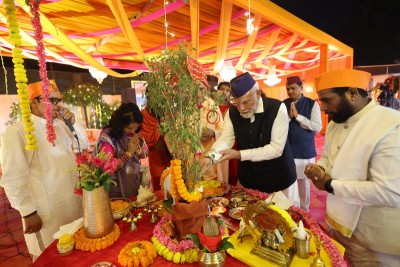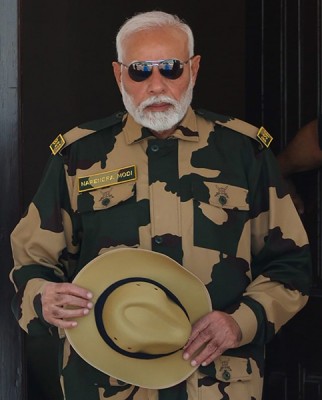 Jharkhand Insurgency
Jharkhand Insurgency
Jharkhand: Plunging Insurgency
On January 28, 2023, a Communist Party of India-Maoist (CPI-Maoist) cadre was killed during an encounter between Security Forces (SFs) and the Maoists at Kari Mandar village under the Kunda Police Station limits in the Chatra District of Jharkhand.
Chatra's Superintendent of Police (SP), Rakesh Ranjan, disclosed that the Commando Battalion for Resolute Action (CoBRA) of the Central Reserve Police Force (CRPF) and District Force personnel, who were on an anti-Naxal [Left Wing extremism, LWE] operation, had an encounter with the squad led by Maoist ‘commander’ Manohar Ganjhu, who had a reward of INR 1.5 million on his head. After the encounter, which lasted for almost an hour, the Maoists fled into the forest.
On January 23, 2023, the Police killed Vishal Sahu, an ‘area commander’ of the People's Liberation Front of India (PLFI), a splinter group of the CPI-Maoist, in an encounter at Mudla Toli in Thakurgaon, Ranchi District. Vishal's squad had reached the Thakurgaon area to collect ‘levy’ (extortion money) from a businessman.
Following information, the Police laid siege, and the militants started firing on the Police. In retaliatory fire by the Police, Vishal Sahu was killed, while the other Maoists in the group managed to escape.
On the first 35 days of the current year, two Naxalites have thus been killed in Jharkhand (data till February 5, 2023).
According to partial data collated by the South Asia Terrorism Portal (SATP), at least 21 fatalities, including six civilians, two SF personnel and 13 Naxalites, were recorded in Jharkhand, in LWE-linked violence in 2022, as against 25 such fatalities, including 11 civilians, six SF personnel and eight Naxalites, in 2021. The 2022 tally is the lowest number of overall fatalities recorded in the State since March 6, 2000, when SATP started compiling data on LWE. A previous low of 25 fatalities was recorded in 2021. Overall fatalities in the State have been declining since 2014, barring spikes in 2016 and 2019.
Fatalities in the civilian category, one of the primary indicators of security in conflict zones, suggest an improving environment, with a decline of 45.45 per cent in 2022, from 11 in 2021 to six in 2022. Civilian fatalities in 2022 were the lowest in the State since March 6, 2000. A previous low of eight fatalities was recorded in 2020. A high of 79 civilian fatalities was recorded in the year 2011.
Moreover, SFs killed 13 Naxalites in the State in 2022, while they lost two of their own personnel, yielding a SF:Naxalite kill ratio of 1:6.5. Comparatively, in 2021, SFs killed eight Naxalites and lost six of their own personnel, yielding a kill ratio of 1:1.33.
The top five positive kill ratios achieved against the Naxalites in the State, since March 6, 2000, in descending order, were 1:9 in 2020, 1:7.4 in 2015, 1:6.75 in 2017, 1:6.5 in 2021, and 1:5.75 in 2007. Conversely, the kill ratio favoured the Naxalites on six occasions – 1.15:1 in 2001, 5.13:1 in 2002, 2:1 in 2004, 1.4:1 in 2005, 1.41:1 in 2006, and 1.16:1 in 2009. Significantly, however, the overall kill ratio since March 6, 2000, favours the SFs, at 1:1.42.
Out of a total of 24 Districts in Jharkhand, the number from where killings were reported remained the same in 2022, as in 2021, at seven. However, only three – Latehar, Lohardaga and West Singhbhum – were common to both years. In 2022, fatalities were reported from Latehar (six), West Singhbhum (four), Khunti and Lohardaga (three each), Seraikela-Kharsawan and Ranchi (two each) and Giridih (one). In 2021: West Singhbhum (nine), Gumla (five), Latehar (four), Lohardaga (three), Palamu (two), Chatra and Hazaribagh (one each).
As with the fall in overall fatalities from 25 to 21, and in incidents of killing from 22 to 14, other parameters of violence also recorded a declining trend. the Maoists triggered explosions on at least 12 occasions in 2022, as against 13 such explosions in 2021. At least eight incidents of arson were recorded in 2022, as against nine in 2021. Moreover, the Maoists issued bandh (general shut down strike) calls on two occasions in 2022, as against five such incidents in 2021.
Meanwhile, at least 155 LWE cadres were arrested in 2022, in addition to 141 such arrests in 2021. 92 Maoists were arrested in 2020, and 69 in 2019. Till February 3, 2023, another 18 LWEs had already been arrested in the current year. Mounting SF pressure also yielded the surrender of 18 Maoists in 2022, in addition to 17 such surrenders in 2021, as well as 11 each in 2020 and 2019. Another nine LWEs have already surrendered in the current year (data till February 5, 2023).
According to SATP, based on assessments of underground and over-ground activities of the Naxalites in 2022, seven districts – Latehar, West Singhbhum, Khunti, Lohardaga, Seraikela-Kharsawan, Ranchi and Giridih – were categorized as moderately affected; while, four Districts – Palamu, Hazaribagh, Bokaro, and Gumla – were in the marginally affected category. In 2021, seven districts – West Singhbhum, Gumla, Latehar, Lohardaga, Palamu, Chatra and – were moderately affected; and, eight – Bokaro, Deoghar, Garhwa, Giridih, Khunti, Ramgarh, Ranchi and Seraikela-Kharsawan – were marginally affected.
The State also witnessed a waning influence of the PLFI, Tritiya Prastuti Committee (TPC), Jharkhand Jan Mukti Parishad (JJMP) and other lesser CPI-Maoist splinters. Around 19 LWE groups are known to be present in Jharkhand.
On January 27, 2023, Jharkhand Chief Minister Hemant Soren visited the former Maoist bastion, Budha Pahar, a 55-square kilometre forested area at the tri-junction of Latehar and Garhwa Districts in Jharkhand, and Balrampur in neighbouring Chhattisgarh, around 150 kilometres from State capital Ranchi. The area was finally freed by SFs, after over three decades of LWE dominance. On September 21, 2022, development projects worth INR 1 billion were unveiled under the Budha Pahad Development Project (BPDP). Addressing the people at Budha Pahad, Chief Minister Soren declared:
'Once this area was witness to the terror of Maoists, who kept the area under their control. However, our security forces have made it Naxal free… Perhaps for the first time there is such a pleasant atmosphere. In the coming days, this area will see milestones in terms of development. With the help of guns, you can create an atmosphere of fear and dread for some time, but it is neither in your interest nor in the interest of society. Leave the gun… Today the government is working to provide you coverage under schemes, by coming to your doorstep. By joining these schemes, choose living with self-respect.
Chief Minister Soren launched schemes worth INR 52.7 million, to promote forest products, and handed over enrolment letters to citizens under the Chief Minister Employment Generation Scheme. He also appealed to the youth of the area to stay away from violence and announced plans to open a medicine shop in every village, with those who have studied up to intermediate eligible for licence to open such outlets. These shops would be connected with Government doctors over mobile phones, for round-the-clock service.
According to a November 21, 2022, report, the CRPF established three new Forward Operating Bases (FOBs) in the remote Naxalite-affected areas of Jharkhand and neighbouring Chhattisgarh as part of its strategy to strike deep into the CPI-Maoist strongholds. While one FOB each has been established in Sukma and Bijapur Districts (Chhattisgarh), the third was created in Jharkhand’s West Singhbhum District, to serve as a base for the SFs to launch coordinated operations in the surrounding areas. These FOBs will also help in cutting off the Maoist supply lines.
The National Investigation Agency (NIA) has taken several steps against LWE elements. Most recently, on January 20, 2023, the NIA filed a charge sheet before the NIA Special Court, Ranchi, against Tarun Kumar and Pradyuman Sharma, in a case related to the funding of the CPI-Maoist. The case was registered suo-moto by the NIA on December 30, 2021, and relates to a conspiracy by the members of the CPI-Maoist for its revival in the Magadh Zone, and to raise funds for the organization.
On January 8, 2023, the NIA filed a supplementary chargesheet before the NIA Special Court, Ranchi, against 14 accused, in connection with the Naxalite attack on former Member of Legislative Assembly (MLA) Gurucharan Nayak and the killing of two Police personnel on January 4, 2022 in West Singhbhum.
There are, however, some residual threats. In the most recent incident, on January 18, 2023, PLFI cadres set ablaze two vehicles of the company contracted to work on railway doubling near Odga Railway Station in Simdega District. The extremists left a pamphlet and warned that the same treatment would be meted out if any work was done without taking the outfit’s permission.
On January 17, 2023, the CPI-Maoist announced a Jharkhand bandh on January 22, 2023, in protest against the arrest of Krishna Hansda aka Avinash aka Saurabh, a ‘regional committee member’ (RCM), who had a reward of INR 1.5 million on his head. Hansda was arrested by the Police and paramilitary forces from the Fatehpur village of Dumri. Another accomplice, Renuka Murmu, was arrested from Chaparia village under the Jasidih Police Station area of Deoghar. CPI-Maoist alleged that both had been tortured during detention.
On January 13, 2023, the CPI-Maoist triggered three IED blasts in the Tumbahaka Forest in West Singhbhum District, when SFs were carrying out a search operation. However, nobody was hurt in the explosions.
On November 3, 2022, Maoist posters surfaced at Bandih Mor and Kashmar village in the Oria Panchayat (village level local self-Government institution) under Kamalpur Police Station in East Singhbhum District. Written in red ink and in Bengali, the posters stated that the villagers should not think that the Maoist were finished. They were still there and would soon avenge the death of Kishan ji alias Mallojula Koteswara Rao, the Maoist leader who was killed on November 24, 2011. “Lal Salaam” and CPI-Maoist were inscribed at the bottom of the poster.
Jharkhand continues to lag significantly in terms of the strength and quality of the State Police Force, which constitutes the first line of defence against any kind of internal challenge. According to Bureau of Police Research and Development (BPR&D) data, there was a vacancy of 18,751 personnel, (22.63 per cent of the sanctioned strength of 82,853), in the State. Inexcusably, of a total of 564 Police Stations in the State, 211 (37.41 per cent of the total) had no telephones, 31 Police Stations (5.49 per cent of the total) had no wireless/mobiles, and 47 Police Stations (8.33 per cent of the total) had no vehicles. Further, of a sanctioned strength of 149 apex Indian Police Service (IPS) Officers in the State, 35 posts (23.48 per cent) remained vacant, considerably weakening the executive direction of the Force.
Despite critical deficits in the deployment of SFs, a noticeable improvement has been engineered on the ground, in containing the LWE menace. Several challenges, nonetheless, remain, and both the State and Central Governments will need to boost their efforts to bring the residual affected areas under the complete sway of the State.
Support Our Journalism
We cannot do without you.. your contribution supports unbiased journalism
IBNS is not driven by any ism- not wokeism, not racism, not skewed secularism, not hyper right-wing or left liberal ideals, nor by any hardline religious beliefs or hyper nationalism. We want to serve you good old objective news, as they are. We do not judge or preach. We let people decide for themselves. We only try to present factual and well-sourced news.







